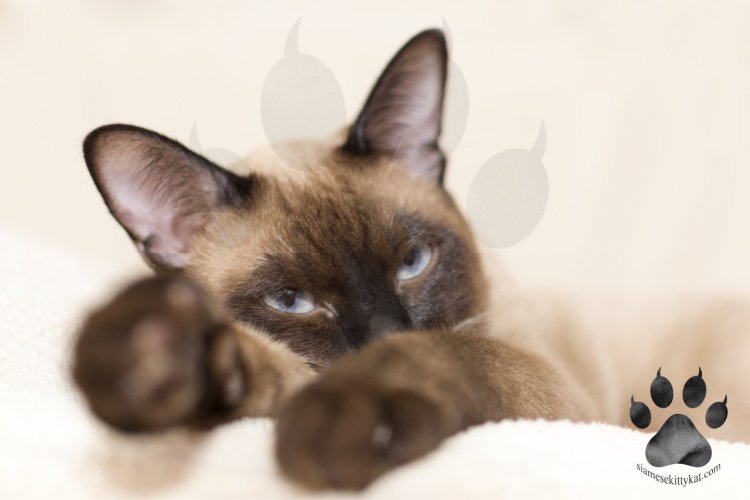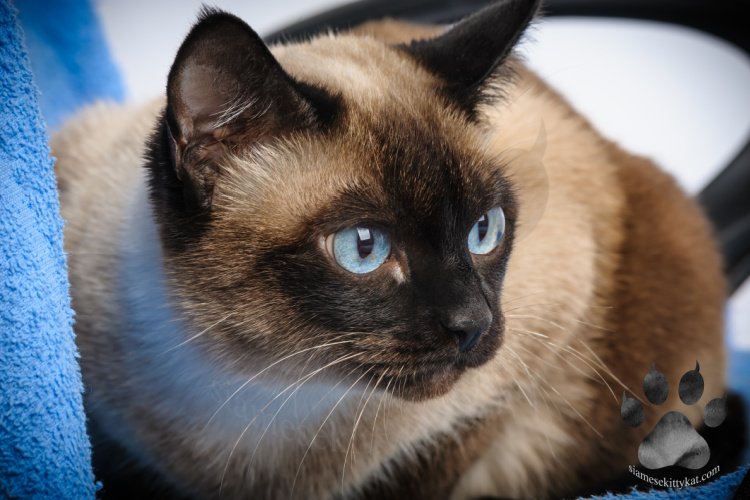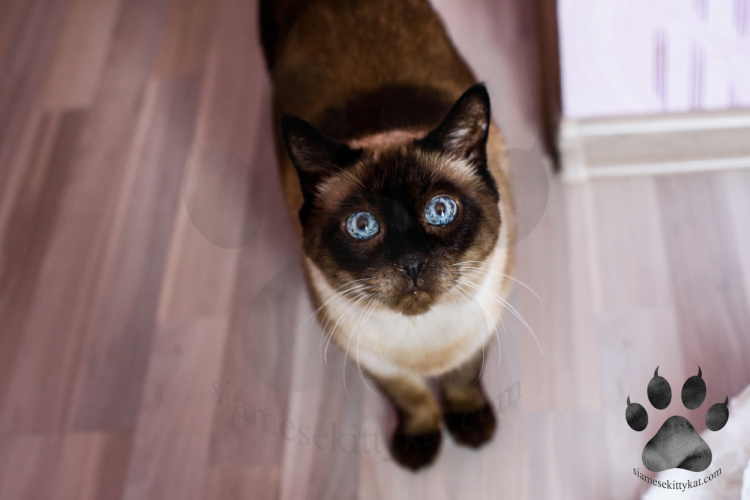Have you ever caught your Siamese staring at a wall and thought, “what goes on in that mind of yours?” I know I’ve sat and wondered what my Siamese kitties, Batman and Robyn, are planning for the afternoon.
Cats are mysterious little beings, and it can be quite difficult to figure out what they’re thinking. While there aren’t special tools that allow us to read our kitties’ minds (despite what phone apps claim to do), there are quite a few social cues and behavioral patterns we can go off.
So, if you have questions like “Can my cat understand English?” or “Does my cat think I’m a huge, balder version of them?” then keep on reading!
What goes on in a Siamese cat’s mind?
If only cats could talk, am I right? Well, even though Siamese cats aren’t capable of communicating in English, they sure don’t let that stop them.
Many mornings I am woken up to the sound of screaming, for lack of a better word, coming from one of my Siamese. And it makes you think; what on earth is going on in your mind?!
Cats are mysterious creatures, and we may never know truly what is going on in our feline’s minds. What we do know, however, is that cats can’t think on the same levels as humans can. So, your Siamese will never have thoughts about:
Cat’s don’t have the ability to daydream or think about seemingly meaningless things, as they lack a default mode network. A default mode network is what activates inside our brains when we’re thinking idly. Our minds disconnect and wonder when we’re not focused on something, say work or cooking dinner.
Due to this network, humans convey feelings more deeply, thinking not only about their surroundings but themselves, too. This kind of network has yet to be discovered in any animal, so that may be why cats appear to be rather “simple-minded.”
So, when your Siamese is staring at a wall, seemingly lost in thought, they’re not plotting world domination. Or, how to get revenge on Spot the dog for eating their treats; they really are just staring at a blank wall.
That’s not to say that Siamese cats are stupid, oh no-no. Siamese cats are actually incredibly intelligent creatures, which leads us to our next question.
Are Siamese cats intelligent?
Siamese cats are said to be one of the top, if not the most, intelligent cats out there. You have probably noticed your Siamese watching your every move around the house. While yes, this is because they are extremely infatuated with you and want to be up in your business, they are also actively analyzing your schedule.
Siamese cats are pros when it comes to knowing the ins and outs of your day. They will note what time you eat breakfast when you usually go shopping, and what time you go to and from work.
Siamese are also highly trainable cats, with the ability to learn tricks and walk around on a lead. You can teach them how to sit, give them your paw, fetch, and I even have a friend who taught her Siamese how to play dead.
Due to this intelligence, Siamese cats need a lot of mental stimulation. This is why they often get called mischievous, as they can quickly turn to naughty or destructive behavior when bored. But really, they’re just very curious creatures with a flair for adventure.
What do cats think about all day?

If you have the idea that cats sit around all day and think about food and sleep, you’re on the right track. The thought process of a Siamese is pretty straightforward. When they’re not paying attention to anything, in particular, they’re not really thinking about anything.
This can be viewed as a meditative state. The cat can feel (happy, content, sleepy) but can’t think about their feelings.
When something distracts their meditative state, this is when their working memory is activated. This process allows your Siamese to react appropriately to the given situation. The working memory can hold information for a short amount of time, not to be confused with short-term memory, which lets go of data quickly instead of taking in information for a brief period.
It may sound confusing, but it basically means that cats don’t think about much unless they’re actually doing something such as playing or eating. Then, their working memory is triggered, and they use past experience to remember if a particular toy is safe to play with or if the sound of keys jingling means you’re ready to go to work. But, they don’t have the ability to daydream or think about the future.
Do Siamese cats understand words?
It depends on what you class as “understanding.” Do cats realize that certain words result in certain things? Yes. Do they actually comprehend and understand the words you are saying? Unfortunately, no.
Siamese cats can’t fully understand words; however, they can remember the word’s sound and connect it to a specific action. If you read my last article on cats and understanding their names, you’ll know that Siamese cats do indeed know their names. That being said, they don’t actually link it to their identity, rather a sound you make that often results in treats or something good when they approach you.
This is also what happens if you decide to train your Siamese. They’ll soon figure out that sitting when you say ‘sit’ will result in a tasty treat or reward.
However, the ‘understanding’ of words doesn’t always have to be associated with something good. For example, if an owner was to shout “NO” or “STOP” every time their cat did something wrong, followed by a spritz of a water bottle, they will soon learn that “no” comes along with unpleasant experiences.
Your Siamese is clever enough to understand when you are talking to them, but they don’t have the brainpower to comprehend what you are saying entirely.
Do cats think in English?
So, you speak English to your Siamese, that must mean they think in English, right? Well, as cool as that would be, the answer is no. Cats can not think in English as they do not understand the language.
As I mentioned above, it may seem like your Siamese understands you due to responding to certain words, but that is down to learned behavior and habit. Certain gestures, smells, and sounds are associated with specific actions, not understanding English.
What language do cats think in?
This was never a question I really thought about until a friend brought it up in conversation. We sat having coffee and watched Batman play with a ball in the kitchen. He stopped suddenly, staring at the back door for a good two minutes. My friend then asked, “I wonder what he’s thinking?” Followed by “Wait, what language do cats think in any way?”
That’s when I hopped on good old Google to find out that cats don’t think in any language at all!
The reason why we humans think in a language is down to a part of the brain called the Wernicke’s area. This controls our comprehension of language. Cat’s don’t have this area, so it’s believed they don’t think in any language at all.
It takes incredible neurological processing to comprehend a language, and even though our Siamese kitties are the smartest of the bunch, they still don’t have enough brain composition.
Do cats think in their own language?

So if Siamese cats can’t think in a human language, does that mean they think on their own? Maybe their mind is full of “meow meow meow?”
Well, Siamese cats don’t think in meows either, or any type of sound that may come out of their mouths. In fact, most of these sounds were actually created for our benefit since cat-to-cat communication is basically non-verbal.
Meowing isn’t a language; it’s something their clever little brains have come up with to communicate with us humans. Just like a baby, cats know that the best way to get our attention is to be vocal about it. As much as we’d like to think that they’re trying to say something, they’re basically screaming at us in hopes of a reaction.
Cats may meow in various tones are produce different noises, but it doesn’t mean they’re thinking in meows.
Think of it like this; if someone next to you is doing something to annoy you, you may clear your throat in order to make them stop. You’re not thinking in the language of coughs; you’re just doing it to grab their attention.
When cats are hungry, they may let out a more prolonged, seemly pain-filled cry. But they aren’t comprehending it on the scale humans do; they’re simply going off body language and social cues.
Do cats think in languages?
Cats think in pictures, not languages. When I first found this out, I found it difficult to imagine. That little voice in our head guides us through life and is always there, so how could you possibly think without one?
Well, babies don’t think in languages, and not all humans think in languages either. Those of us who do think in languages still don’t think that way all the time. We often think in pictures, similar to our Siamese cats.
Cats use their working memory to guide them through life, processing information and resulting in the necessary reactions. They can think logically and reason without using language; instead, they use their senses to guide them.
What do cats think when we talk to them?
Now that we’ve gathered that cats don’t think in nor comprehend languages, what on earth do they think when we are talking to them?
Well, it works similarly when we listen to their meows. We have absolutely no idea what they are saying, but we can go off their body languages, such as flattened ears or a swishing tail, and other actions to figure out what they mean. The tone of their meows also tells us a lot about how they feel if they’re angry, happy, or hungry.
So, if you speak to your Siamese with a soft and high voice, they’ll gather that what you have to say is positive. If you pair this tone with their name, they’ll probably come to you in hopes you’ll give them a treat or some love.
If you call your Siamese with a low voice or a loud shout, they’ll perceive you as threatening, so they’ll most likely run away and hide until you’ve calmed down.
If you chat to your Siamese about your daily life, you’ll most likely be using a soft and calm voice. They’ll most likely sit and listen to you, maybe even responding with a meow or two. Granted, they have absolutely no idea what you’re talking about, and they’re probably just waiting for a reward.
Cats and emotions

We’ve figured out that cats don’t really think the same way as we humans do, but they obviously have the capability to become angry or happy. So, what other emotions can they feel?
Happy and sad
If you already have a Siamese at home, you’ll probably know that they can feel both happy and sad. Siamese are especially emotional felines and can even become depressed when left alone too long.
If you make a habit of coming home after work without giving a few minutes to greet your Siamese, they’ll quickly become upset with you. In their mind, they’ll think, “why should I bother saying hello if you’re not even going to respond to me?”
Cats feel happy when they’re eating, hunting, relaxing, getting your attention, and being groomed. If you want your Siamese to stay satisfied, you should ensure they don’t have time to be bored.
Anger
You can most definitely make your Siamese angry. If you put them in an unwilling situation or push them to do things they don’t want to, you may make them mad.
Keep in mind we sometimes make cats mad by mistake, even when we have the best intentions. If you see a cuddly cat on the street or even at your friend’s or family’s house, you may quickly scoop them up for a cuddle. This can easily make the cat feel cornered and uncomfortable, especially if they aren’t familiar with us, which can quickly lead to anger.
Don’t worry if you’ve ever made a cat mad, though; they can’t hold grudges. They can’t plot ways to get back at you, so even if it seems like they’ve pee’d purposely in your shoe because you fed them ten munites late last Wednesday, that isn’t the case.
Loyalty
My Siamese cats are the most loyal creatures I’ve ever had the pleasure of meeting, and you can’t tell me otherwise!
Once cats have firmly established their place at home and created a bond, they are very loyal creatures. Many people believe that they aren’t as loyal as canines, but that really isn’t true.
Dogs don’t really know the meaning of personal space, whereas cats do like to spend some time alone. (Can’t be said for Siamese, however; probably why they’re referred to as the dogs of the cat world!)
Jealousy
Cats definitely get jealous, but it has more to do with their territory than anything.
While dogs have an alpha of the pack, felines typically share the role of alpha, taking it in turns to own places or people. This is why your cats may begin to fight or get jealous of one another if there isn’t enough space to go around. To curb this, make sure there are plenty of resources for each of your kitties.
Guilt
Believe it or not, both cats and dogs don’t have the ability to feel guilty. For a long time, I was sure that cats could feel guilty. Batman once pooped in the hallway, and I took him back to the scene of the crime to show him what he had done. He got quite small, and his ears went droopy, wearing a similar expression that humans feel when they feel guilty about something.
Turns out, he wasn’t feeling guilty at all; he was just scared because he could read me at that moment. He knew I was angry, so he shied away in response.
Do cats think about their past?
Have you ever wondered if your cat thinks about what life was like before you? Do they think about the time they were with their cat family, or maybe they miss their previous human family?
Well, don’t worry too much, as cats do not have the ability to think about their past. Of course, they do remember things, but this isn’t related to their thought process and is more about their instincts.
Your Siamese’s personality is shaped by their life as a kitten. If they go through any traumatic events, for example, being chased with a certain object, they may develop a fear of said object and take it into adulthood. Your Siamese will not think about this traumatic event in everyday life; however, they will learn to avoid it if they reencounter this object.
They avoid the trauma due to instinct and not by the actual memories they went through to get to the trauma. This is all down to a survival technique used to protect cats from stress or harm.
Does my cat think I’m a cat?
You’ve probably heard that cats view their owners as bigger, stupider, more clumsy cats. While that is partly true, they don’t think their owners are stupid!
If you take a look at how your cat interacts with you, you’ll notice it is very similar to how they interact with other cats. They’ll rub on your legs, headbutt you, groom you, and communicate with their tails. Cats don’t interact this way with other animals, so it’s suggested that they think of us as larger, more clumsy cats.
So, keeping that in mind, the best way to show your cat love is to replicate how they express it to us!
Want to immerse yourself more in the captivating world of Siamese cats? I’ve got all the information you need from their distinct color points to their fun personalities: Siamese Cats: Unique Features and Personality
Get your FREE Siamese Cat 2024 Printable Calendar


